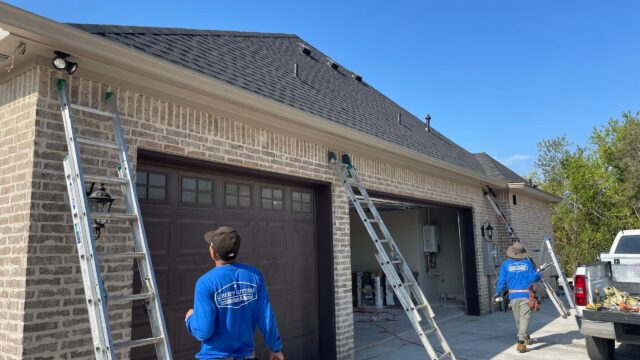
Finding the Perfect Rain Gutters for Texas Homes
Texas weather is unpredictable – from scorching heat to heavy rain. For homeowners, a reliable rain gutter system is important to safeguard structure, siding, and the foundation of their homes. But with so many options how do you pick the right rain gutters for Texas weather? From gutter styles and materials to sizing and maintenance tips, this guide has got you covered.
How Rain Gutters Function in Texas’ Unique Climate
Rain gutters are more than just metal or plastic channels on your roof – they help control rainwater. In Texas, where storms can be intense, gutters direct rainwater away from the roof, foundation, and landscaping. Without them, rainwater can pool around your home’s base, causing foundation damage, erosion, and basement flooding. Properly installed gutters direct rainwater into downspouts and away from areas where it could damage the structure.
Different Styles of Rain Gutters for Texas Homes
Not all rain gutters are created equally. The following are the most common styles found on Texas homes:
Box Rain Gutters
Design: Box gutters are large, round gutters which hold a great deal of water.
Best Use: Ideal for commercial properties or areas where the rain is intense.
Benefits: High water capacity and good for Texas areas with high storm potential.
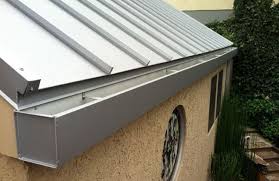
K-style Rain Gutters.
Design: These gutters are decorative, crown-molding-like in appearance and are one of the most common choices for residential homes.
Best Use: Appropriate for most residential properties in Texas.
Benefits: They’re stylish and functional and hold a lot of water.
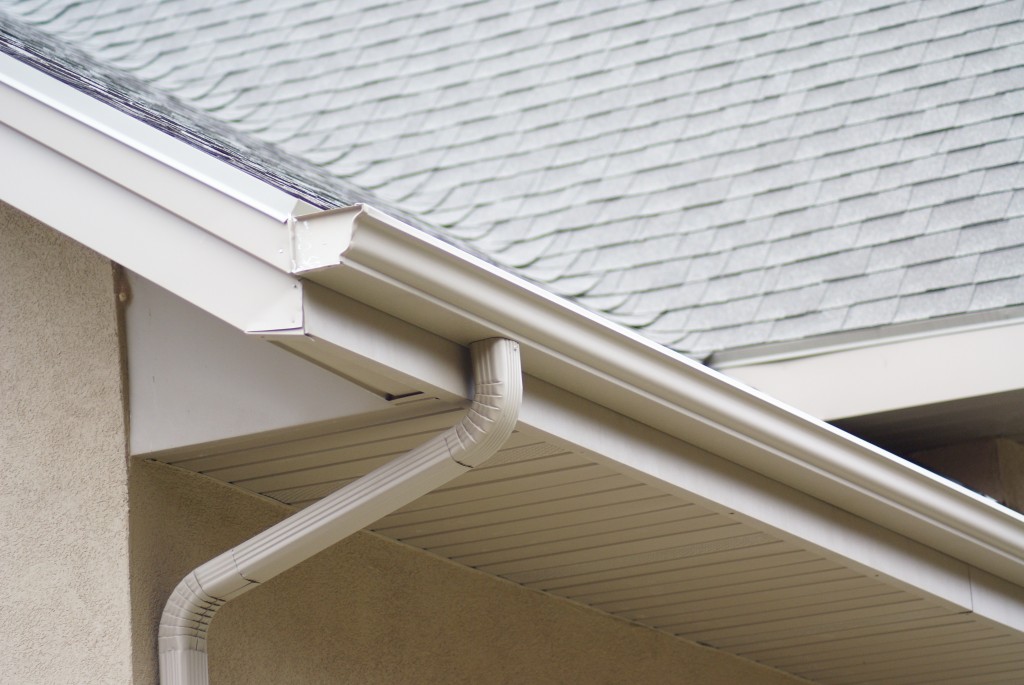
Half-Round Rain Gutters.
Design: Shaped like a half-cylinder, these gutters provide a traditional look.
Best Use: Usually found on older or historical-style homes but can also be found on modern homes.
Benefits: They are easy to clean because of their open design, but they hold less water than K-style or box gutters.
Rain Gutter Materials: Which One Should You Choose?
Your rain gutter material will affect the performance, cost, and durability of these rain gutters. Each option has pros and cons that suit certain weather conditions.
Vinyl Rain Gutters.
Durability: Lightweight and corrosion resistant.
Cost: Budget-friendly option.
Drawback: Not as tough in extreme Texas heat and can crack.
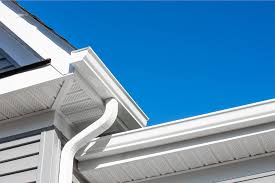
Aluminum Rain Gutters.
Durability: Rust-resistant, lightweight and can handle moderate flow of water.
Cost: It is Affordable and a popular choice for Texas homeowners.
Drawback: Predispose to denting from falling branches or debris.
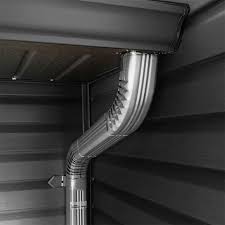
Stainless Steel Rain Gutters.
Durability: Strong and robust enough to withstand rain and dirt.
Cost: It is more expensive than vinyl or aluminum.
Drawback: Easily rusty if not maintained or coated.
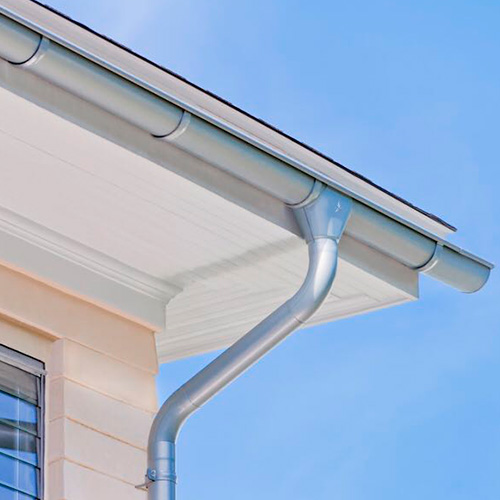
Copper Rain Gutters.
Durability: Extremely tough and corrosion resistant.
Cost: Premium option, much more expensive than other materials.
Drawback: Changes color (patinas) over time which can be a benefit or a drawback depending on your aesthetic preference.
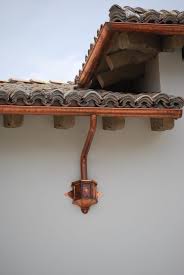
Seamless gutters
These gutters are constructed of one continuous piece of material and have a clean look. They have no seams or joints, so they are less susceptible to leaks and better able to channel rainwater. They are custom fit for your home, minimizing water damage to your foundation, roof, and landscaping.
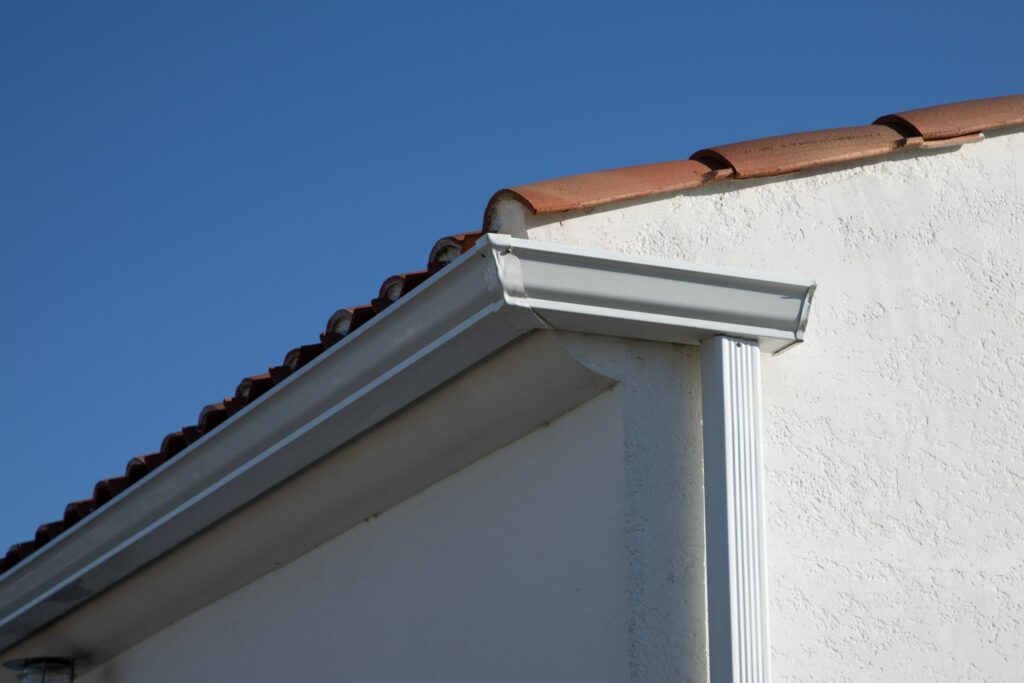
Rain Gutter Sizing and Essential Factors to Consider
The right size for your rain gutters is very important. The important points to remember:
Gutter Parts and Components.
- Sections of gutter: Long, hollow channels collect and channel rainwater.
- Downspouts/downspouts: Vertical pipes direct water from the gutter to the ground or a drainage system.
- Elbows and Connectors: Allow downspouts to change direction if needed.
- Hangers & Brackets: Fix the gutters to your roofline to prevent sagging or detaching.
Installation and Maintenance.
- Installation Tips: Proper slope and alignment are important for the water to flow properly. Hiring a professional makes sure of the installation.
- Maintenance Needs: Clean your gutters at least twice a year to remove other, twigs, and leaves debris that could block them. Gutter guards can cut down on maintenance.
Size and Capacity Considerations.
- Size Does Matter: Rain gutters typically are available in 5-inch, or 6-inch sizes and larger sizes hold more water.
- Local Rainfall: Some areas of Texas get heavy rain, so larger gutters may be needed to keep overflow from occurring.
- Roof Size & Slope: A steep or large roof will push more water into the gutters, so bigger gutters may be needed.
Components and Accessories of Gutters: Essential for Efficient Water Management
Properly installed and maintained gutters are essential to controlling Texas’ heavy rains. Knowing the key components and accessories of a gutter system can help ensure its protection for your home. The essential parts are listed below:
Home Components:
✔ Eaves: The lower edges of a roof that reach over the walls to accommodate the gutters that collect rainwater.
✔ Fascia: The horizontal board which runs on the edge of the roof to keep the gutters in place. It helps with the overall structure of the gutter system.
✔ Soffit: The underside of the roof overhang, which protects the attic from dampness and debris but allows airflow to prevent mold growth.
Gutter Components:
✔ End Cap: A cover at the end of a gutter system to prevent water from flowing out the sides helps keep the system together.
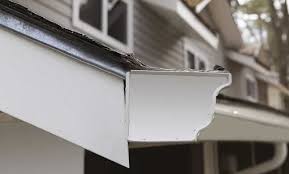
✔ Downspout A vertical pipe leads rainwater from the gutters down to the ground for drainage away from the foundation.
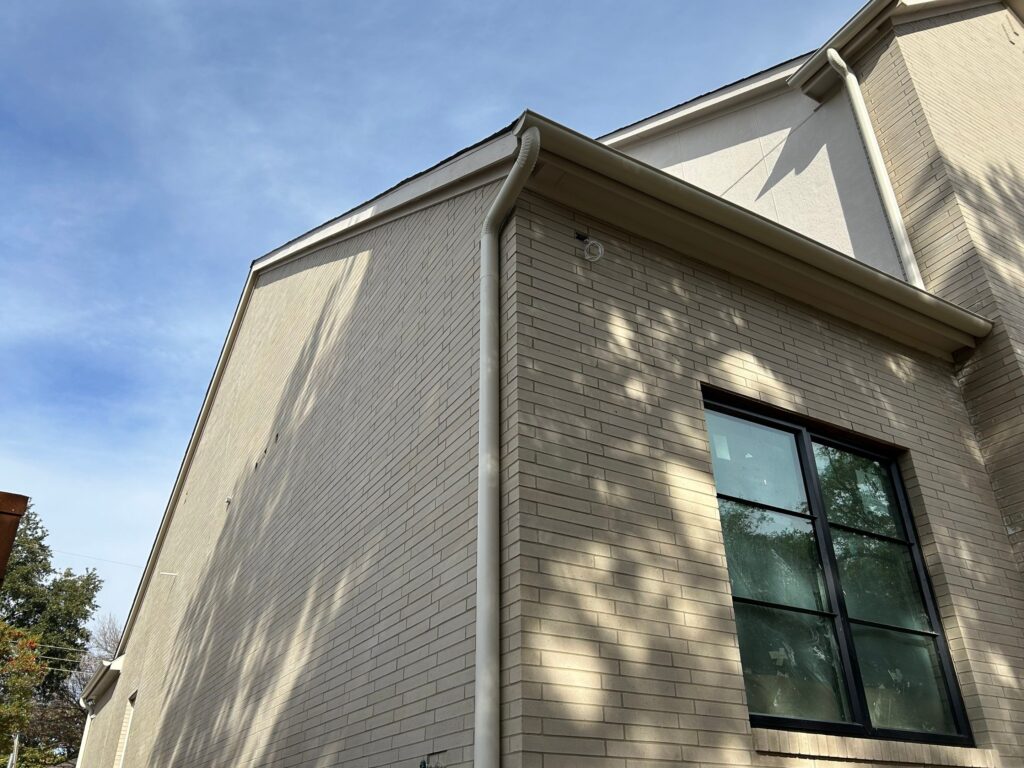
✔ Elbow/Joint: A curved connector that changes the direction of the downspout or gutter system.
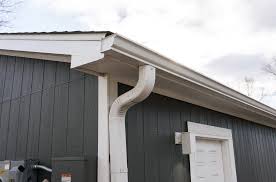
✔ Flashing: A metal or plastic strip that prevents water from leaking behind the gutters, sealing joints and edges to prevent water from entering the gutter system.
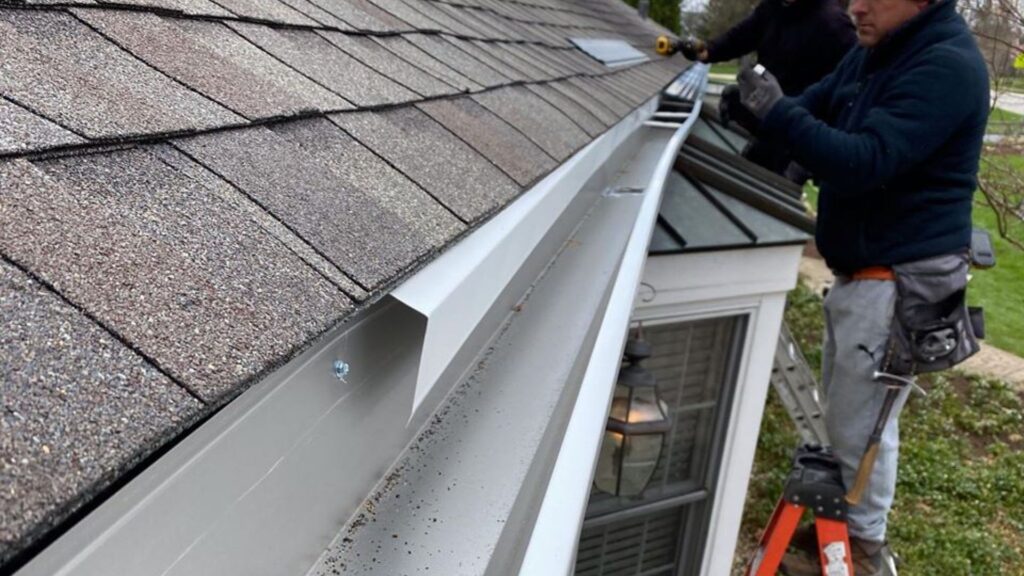
✔ Gutter/Trough/Run: These are the actual “gutters” that run along the edge of the top channel, the main channel where rainwater collects.
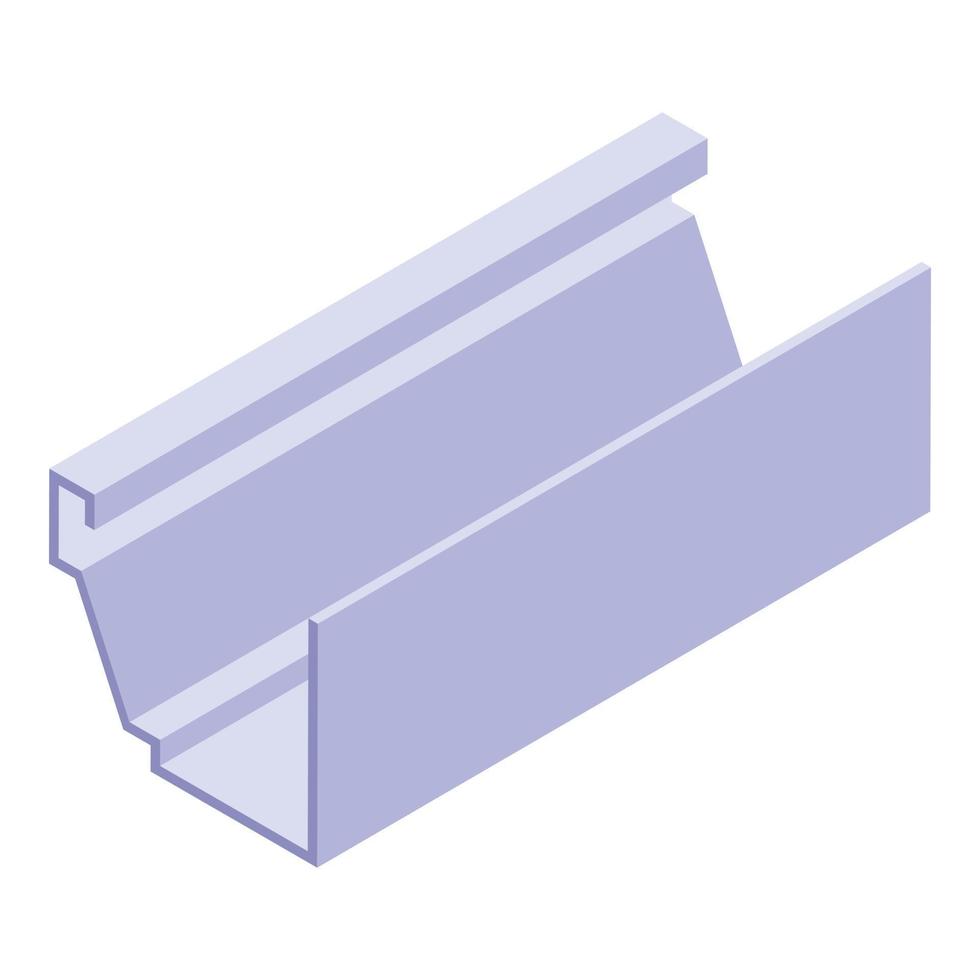
✔ Hanger: The bracket or support system that holds the gutters in place to keep them attached to the fascia.
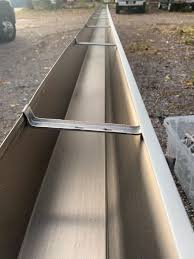
✔ River: Sometimes mislabeled as gutter run, it talks about the movement of water throughout the gutter system, where a few gutters feed into each other.
✔ Splash Block/Boot Shoe: It is placed below the downspout to divert water away from the foundation to prevent erosion and water damage.
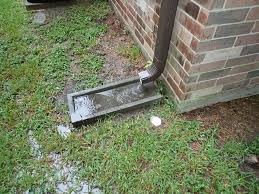
Optional Accessories: Enhance Your Gutter System.
Besides the essentials, there are optional accessories that can help make your gutter system even more effective at handling Texas’ heavy rain.
✔ Barrels of Rain: These accessories hold rainwater from your gutters and also offer an environmentally friendly way to water your backyard, lawn, or plants. Rain barrels can help conserve water, especially in drought areas.
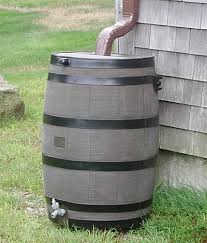
✔ Rain Chains: Rain chains redirect water from the gutter to the ground in a decorative way, as compared with traditional downspouts. They add character to your home’s exterior and provide a water feature on rainy days.
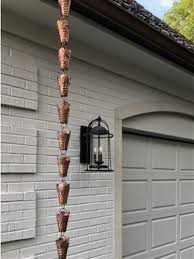
Knowing these components and accessories can help you ensure that your home’s gutter system can withstand Texas rain, including summer storms and winter downpours.
Conclusion: Choosing the Right Rain Gutters for Your Texas Home
Choosing the right rain gutters for Texas depends on your home’s style, climate and budget. K-style gutters are preferred for most residential homes, box gutters are better for heavy rain and half-round gutters offer a classic look. Materials – aluminum offers affordability and performance, while copper is a premium, long-term solution. Proper sizing, installation and maintenance are key to having your gutters work properly. Making the correct decision can safeguard your house from water damage and extend its life.
Ready to install or upgrade your gutters? Liberty gutters can help. Call us for expert advice and installation to keep your home safe from Texas’ unpredictable weather.











